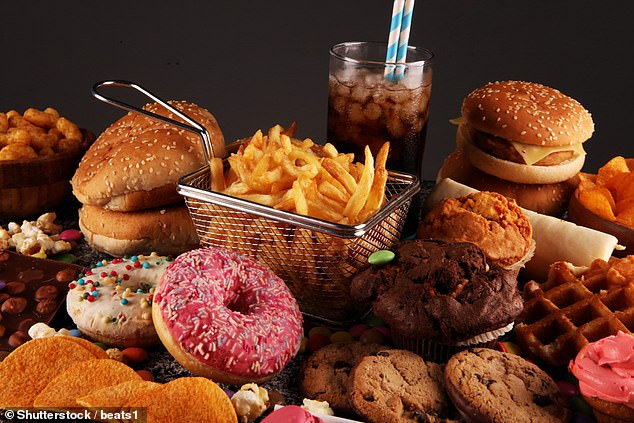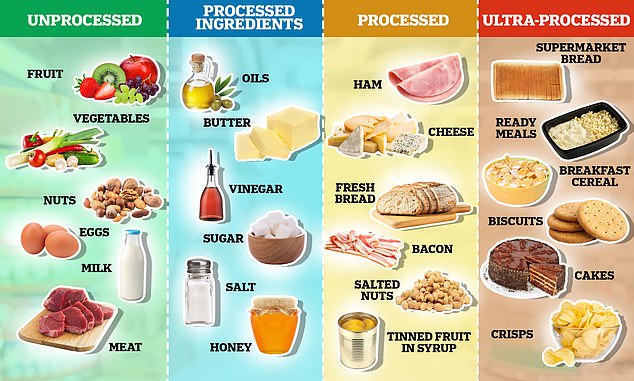A major study has pinpointed the additives in ultra-processed food that put you most at risk of an early death.
It’s long been understood that ultra-processed food can lead to all sorts of life-shortening conditions.
German researchers who looked at data of over 180,000 participants broke down the worst food additives into five categories.
This included flavouring, flavour enhancers, colour agents, sweeteners and varieties of sugars—which are all found in ultra-processed foods.
But they went further to identify 12 specific markers of ultra-processed (MUPs) foods that were found to significantly increase risk of death.
These included the flavour enhancers glutamate and ribonucleotides, as well as the sweeteners acesulfame, saccharin and sucralose.
It also included processing aids like caking agents, firming agents, gelling agents and thickeners as well as the sugars fructose, inverted sugar, lactose and maltodextrin.
Meanwhile, gelling agents like gelatine was significantly linked to mortality but inversely—lowering risk of death.

A major study has identified the additives in ultraprocessed food most linked to an early death
They also found modified oil, protein source, and fibre had no significant association with risk of death.
In the journal eClinicalMedicine, they wrote: ‘To the best of our knowledge, no prior study has assessed associations of such a broad range of MUP categories and specific MUPs with all-cause mortality.’
The researchers used data from the UK Bio-bank, which tracked adults between 2006 and 2010.
The average age of participants was 57, and 57 percent of the cohort were female and 43 per cent male.
They found on average a fifth of participants’ food intake was made up of UPF—food that contains more than one ingredient you rarely find in a domestic kitchen.
When they followed up with them after 11 years, the found 10,203 participants had since died.
Their analysis revealed that as UPF intake rose above 18 per cent, the risk of dying increased.
However, the authors cautioned that consumption data in the study was self-reported and not independently verified.

These ultra-processed food markers can often be found in breads, biscuits, crisps and cakes
Nevertheless, previous studies have linked UPFs to obesity, heart disease, type 2 diabetes, certain cancers and an early death.
And just last month, research eating too many UPFs could be stopping you from losing weight.
British scientists who tracked dozens of adults found those who avoided UPFs, lost twice as much weight as those who often consumed them.
Sticking to meals cooked from scratch could also help curb food cravings, but UPFs had little impact on blood pressure, heart rate, liver function and cholesterol.
They argued their findings echoed calls to limit certain types of UPFs but cautioned it also showed not all UPFs are ‘inherently unhealthy’.
Dr Samuel Dicken, from University College London, study co-author, said: ‘We saw significantly greater weight loss on the minimally processed food diet.’
WHAT ARE ULTRA-PROCESSED FOODS?
Ultra-processed foods are high in added fat, sugar and salt, low in protein and fibre and contain artificial colourings, sweeteners and preservatives.
The term covers food that contains ingredients that a person wouldn’t add when cooking at home — such as chemicals, colourings and preservatives.
Ready meals, ice cream, sausages, deep-fried chicken and ketchup are some of the best-loved examples.
They are different to processed foods, which are processed to make them last longer or enhance their taste, such as cured meat, cheese and fresh bread.
Ultra-processed foods, such as sausages, cereals, biscuits and fizzy drinks, are formulations made mostly or entirely from substances derived from foods and additives.
They contain little or no unprocessed or minimally processed foods, such as fruit, vegetables, seeds and eggs.
The foods are usually packed with sugars, oils, fats and salt, as well as additives, such as preservatives, antioxidants and stabilisers.
Ultra-processed foods are often presented as ready-to-consume, taste good and are cheap.
Source: Open Food Facts
Share or comment on this article:
Longevity experts reveal the common food additives which are WORST for your health
